Control the Mass Flow of Fuel Gas with Coriolis Meters
When you can control processes in refineries and petrochemical plants, you can better control the revenue generated by those facilities. The heat from fired heaters drives those processes, generating the steam for boiler applications, helping to catalyze cracking, fractionation or distillation. It stands to reason that by controlling the heat, or energy consumption, you’ll have one part of maximizing the revenue mastered.
But conditions change, sometimes rapidly and significantly. The root cause of heating value variability, leading to fluctuations in %O2 in the flue gas, is that the gross heating value of components in fuel gas and natural gas change during operation. How much does that matter? Reducing the O2 in the flue gas has a significant impact both in terms of energy consumption, and environmental compliance. To put it in perspective, an increase of just 2% O2 could cause an increase of 25% – 30% in NOx emissions – which can lead to permitting issues. And operating with too low a level of O2 in the flue gas creates the risk of sub-stoichiometric combustion, possibly tripping the heater or, in the extreme case, damaging it.
Keeping fired heater operations safe and energy efficient while also operating within environmental regulations is challenging, but when done correctly it reduces fuel usage, helps harvest the greatest volume of products, and is a key aspect of being a good environmental steward.
Finding Control: Measure Mass, Not Volume

Flow schematic for a natural draft fired heater, using Coriolis for the flow control
Volumetric flow meters typically are used to control the fuel gas flow. In many facilities, the process outlet temperature controller and/or the %O2 trim controller give feedback control to the flow controller – but these are lagging indicators.
It’s very important to keep in mind that the gross heating value of fuel gas components correlates much more closely to mass than volume. Therefore, using Emerson Coriolis Flow Meters to control the mass flow of the fuel gas instead of the volumetric flow can help you reduce the variability in the %O2 and stabilize furnace operations while responding to shifting process conditions.
And when you do that, you can improve:
- Operational Efficiencies – The fuel that is consumed in combustion operations can be significantly reduced. In addition, the fuel consumed must be reported to governing environmental regulatory agencies. The meters controlling that process have requirements for accuracy and calibration frequency. Because Micro Motion’s meters feature Smart Meter Verification (SMV), frequently calibrating transmitters or pulling orifice plates or other primary elements to verify measurement accuracy is eliminated.
- Economics – A recent study found that controlling the fuel gas using Coriolis mass flow had a Net Present Value (NPV) of approximately $1,000,000 for a single crude unit charge heater. Temperature, pressure, or MW corrected volumetric flow control showed no benefit over pressure control.
- Safety – Superior control of the fired heater creates a safer operating environment. With constant, real-time process insight, you’ll be able to avoid the risks associated with sub-stoichiometric combustion. Using flow meters equipped with SMV will allow for minimized exposure to hazardous conditions.
There’s a Lot More to the Story
Of course, achieving safe and economic operations as well as regulatory compliance is not as simple as it is framed up in this blog. There’s quite a bit more to know, which is why I encourage you to read the whitepaper we have developed: Safer Combustion Control for Fired Heaters. You’ll find details on the problem, our solutions, and the economic study.
